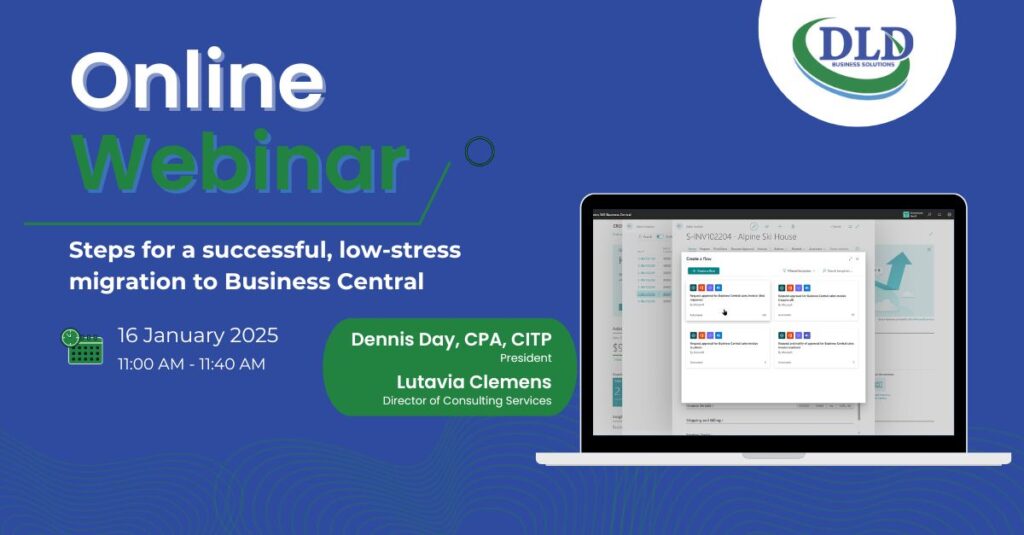Migrate To Cloud ERP for Data-Driven Insights
- November 19, 2024
- Posted by: DLD Business Solutions
- Category: Microsoft Dynamics 365 BC

Advanced Analytics and AI-Driven Insights in Business Central
As a CPA with years of experience in financial management, I’ve seen the incredible impact that data-driven insights decision-making can have on a business. Gone are the days of manual spreadsheets and delayed reports.
Today, data-driven decision-making is a must for companies that want to stay competitive, and cloud-based systems like Microsoft Dynamics 365 Business Central are leading the charge.
In this article, I’ll explain why Microsoft Dynamics 365 Business Central is revolutionizing how businesses use data and why it’s time to migrate legacy, on-premises systems like Dynamics GP, NAV, and SL to the Cloud.
The Power of Data-Driven Decisions
For me, data is one of a business’s most valuable assets, but it’s only as useful as the insights you can draw from it.
Far too often, businesses have more data than they know how to manage. That’s where Business Central excels—transforming raw data into actionable insights that help executives make more intelligent decisions faster.
A key feature of Business Central is its AI-driven insights. The system uses Copilots (Microsoft’s AI assistant) and other technologies to identify patterns, make predictions, and provide recommendations. Whether predicting sales trends or flagging potential operational inefficiencies, AI-driven insights help you stay ahead of the curve.

Imagine a company facing challenges with cash flow management due to delayed customer payments.
By implementing Business Central, they could leverage tools like Copilot and Power BI to analyze payment histories and customer behavior, predicting when invoices are likely to be paid.
With this insight, they can proactively manage working capital, avoid the need for expensive credit options, and make more informed investment decisions—ultimately improving their financial position.
This scenario illustrates the powerful potential of combining Business Central’s functionality with advanced data analysis tools for smarter business management.
AI-Driven Insights: From Predictions to Strategic Actions
I find one of the most impressive aspects of Business Central is how it goes beyond traditional data analysis.
It’s not just about seeing what happened last quarter – it’s about predicting what will happen next. Microsoft technology combines historical data with real-time information and provides recommendations to improve your bottom line.
Take cash flow management as an example. Many companies struggle with predicting when payments will come in.
With Business Central’s AI-driven insights, you can forecast when invoices will be paid, plan for expenses, and even predict which customers might need a nudge to settle their accounts.
This level of financial foresight is invaluable, helping businesses reduce dependency on high-interest credit lines and make proactive decisions.
The capabilities also extend to account reconciliation, where the system can automate manual tasks, reducing human error and freeing up time for higher-level strategic planning.
Power BI: Data at Your Fingertips
One of the most significant transformations seen in recent years is how Microsoft Power BI has changed how businesses visualize and interact with their data.
When integrated with Microsoft Dynamics 365 Business Central, Power BI provides a real-time dashboard that lets you visualize key metrics like sales forecasts, financial performance, and inventory levels—all from a single platform. In addition, Power BI allows you to connect to multiple data sources. This eliminates having to import certain data into BC just to be able to report on it with your BC data.
For finance teams, this is a game-changer. You no longer need to wait weeks for reports to trickle in from different departments. Power BI gives you immediate access to the data you need, allowing you to make informed decisions on the fly.
To illustrate this concept, a distributor might use Power BI to track sales during a real-time promotion. When certain products sell faster than anticipated, they can quickly adjust their marketing and inventory strategies to meet the increased demand.
I suggest that this level of agility would have been impossible with a traditional, manual reporting process.
According to Gartner, businesses using modern BI platforms like Power BI experience a 60% faster decision-making process than those relying on manual methods.
That speed is crucial in today’s business environment, where agility can make or break success.
Real-Time Reporting: The End of Delayed Data
If you’ve ever waited on month-end reports to close your books, you understand the frustration of delayed data. When the information reaches your desk, it’s often already outdated.
With real-time reporting in Business Central, those days are over. You can immediately access up-to-the-minute data on financials, sales, inventory, and more.
For finance teams, you can close the books faster and make decisions based on current information—not what happened last month.
On-Premises ERP vs. Cloud-Based ERP: Why the Cloud Wins
One of the executive team’s most significant decisions is whether to stick with an on-premises ERP system or migrate to the Cloud. For years, companies relied on on-premises systems like Dynamics GP, NAV and SL, but the Cloud offers so many advantages that it’s hard to ignore.
Flexibility and Scalability
On-premises systems are notoriously difficult to scale. If your business grows, you have to invest in new servers, software, and IT infrastructure.
With a cloud-based ERP like Business Central, scaling is as easy as upgrading your subscription. Whether you need to add more users, expand to new regions, or incorporate new business units, the Cloud allows growth without the overhead of on-prem systems.
The Cloud also provides anytime, anywhere access. Whether in the office, working remotely, or traveling, you can access your ERP system securely from any device with an internet connection. This level of accessibility is especially crucial as businesses continue to adopt remote work models.
Lower Maintenance and Automatic Updates
With on-premises systems, companies are responsible for maintaining servers, applying software updates, and ensuring security. These tasks are time-consuming, expensive, and disruptive.
By moving to the Cloud, you eliminate these headaches. Microsoft handles all the updates and maintenance for Business Central, so you’re always working with the latest version, complete with the newest features and security protocols.
Gartner estimates that by 2025, 85% of businesses will have moved to cloud-based ERP systems. The cost savings, reduced maintenance, and automatic updates make it a clear choice for companies looking to stay competitive.
Enhanced Security and Business Continuity
There’s often a misconception that on-premises systems are more secure because companies have direct control over their hardware.
However, cloud-based ERP systems like Business Central are often more secure because they benefit from the massive security investments made by Microsoft. Mid-size companies would struggle to match the same level of security investment.
Cloud systems also ensure business continuity. If your office suffers a power outage or natural disaster, your data remains safe and accessible in the Cloud, allowing you to continue operations without significant downtime.
Reduced Total Cost of Ownership (TCO)
While on-premises ERP systems might initially seem cost-effective, the total cost of ownership (TCO) could be much higher than expected. The costs add up quickly when you factor in hardware, IT support, software updates, and ongoing maintenance.
In contrast, cloud-based ERPs offer a subscription model that includes everything—updates, support, and security—at a predictable cost.
Migrating to Business Central can significantly reduce your TCO, freeing up resources to invest in other areas of your business, such as growth or innovation.
Legacy Systems: Why It’s Time to Migrate from Dynamics GP, NAV, and SL to the Cloud
As valuable as Dynamics GP, NAV, and SL are, it’s clear that they no longer meet the demands of modern business. These on-premises systems are costly to maintain, hard to scale, and lack the real-time data and AI-driven insights companies need today.
Microsoft has announced that support for Microsoft Dynamics GP, NAV, and SL has already ended or will be ending in the near future. The reality is that it is a good time to take advantage of the fact that Microsoft is putting its total resources and development into Dynamics 365 Business Central.
Migrating to Microsoft Dynamics 365 Business Central offers a future-proof solution. You get the flexibility and scalability of the Cloud, the power of AI and advanced analytics, and the security and reliability of a modern system—all without the headaches of maintaining outdated hardware and software.
According to Gartner, by 2026, 40% of ERP implementations will include embedded AI. Companies that fail to migrate risk falling behind and struggling to compete.
Conclusion: Why Business Central is the Future
In my years as a CPA, I’ve learned that having the right data at the right time is essential for making good decisions. Microsoft Dynamics 365 Business Central allows businesses to harness their data effectively.
The future is in the Cloud for those still using legacy, on-premises systems like Dynamics GP or NAV.
From my perspective, once you make the switch, you’ll wonder how you managed without it.


Dennis L Day, CPA, is the President of DLD Business Solutions. He focuses on empowering businesses with intelligent, efficient solutions that drive success.
For over 23 years, we’ve been a trusted partner, delivering expert implementation, migration, and support services for Microsoft Dynamics ERP systems.
Whether you’re optimizing operations, boosting sales, or gaining valuable financial and operational insights, we’ve got you covered.
What sets us apart? We listen.
Our accountants, CPAs, developers, and network specialists work closely with you to tailor solutions that fit your unique needs using the latest Microsoft technologies.
From migrating you from Dynamics GP to cloud-based Dynamics 365 Business Central to optimizing your entire business, we provide real-world solutions and long-term support to help your business thrive.
